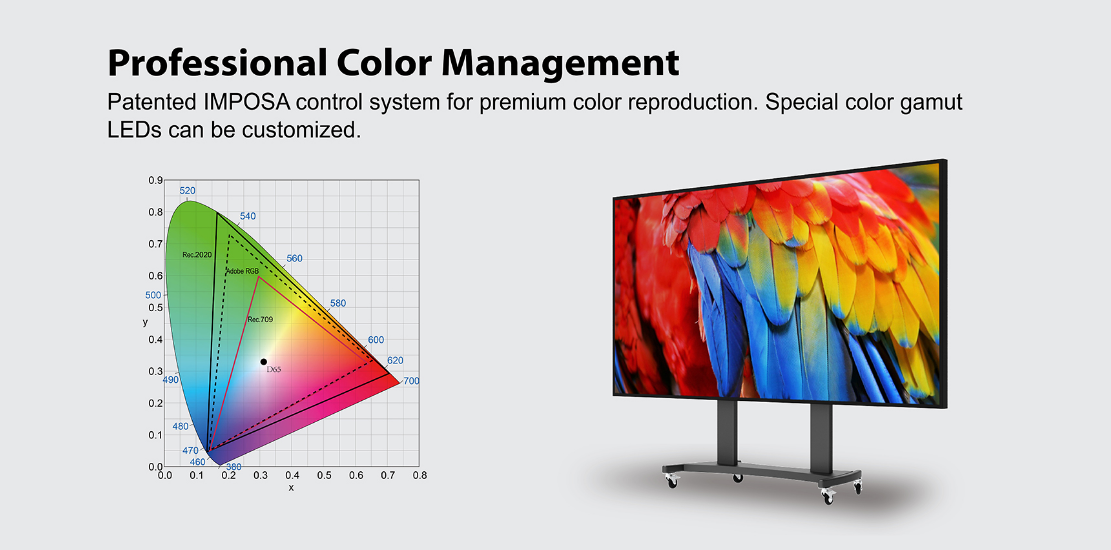Tips for Buying Indoor LED Screens
What Are LED Screens?
LED (Light Emitting Diode) screens use tiny LEDs to create images. Unlike traditional screens, they offer vibrant colors and high brightness, making them ideal for indoor use.
Indoor led displays are large format screens based on led technology, composed of several cabinets, seamless (unlike other technologies such as LCD or OLED) able to play static pictures as well as any video formats as if it was a large format PC monitor.
Benefits of LED Screens
- High Brightness: Perfect for well-lit indoor environments.
- Energy Efficiency: Consumes less power compared to other display types.
- Longevity: Durable and long-lasting, making them a good investment.
Key Factors to Consider
1. Purpose of the Screen
Determine the primary use of the LED screen. Are you using it for advertising, presentations, or entertainment? The purpose will guide your choice in size, resolution, and other specifications.
2. Screen Size and Viewing Distance
The size of the screen should correspond to the size of the room and the distance from which it will be viewed. Larger screens are suitable for larger spaces, while smaller screens work well in more intimate settings.
Screen Size Recommendations
- Small Rooms (up to 20 sqm): 32-55 inches
- Medium Rooms (20-50 sqm): 55-75 inches
- Large Rooms (50+ sqm): 75 inches and above
3. Resolution and Pixel Pitch
Resolution refers to the clarity of the image. Higher resolutions provide sharper images. Pixel pitch, the distance between the center of two adjacent pixels, also affects image quality. Smaller pixel pitch results in better image quality, especially at closer viewing distances.
Common Resolutions
- HD (1280x720): Suitable for small to medium screens.
- Full HD (1920x1080): Ideal for medium to large screens.
- 4K (3840x2160): Best for large screens with high detail.
4. Refresh Rate
A higher refresh rate (measured in Hertz) means smoother motion on the screen. This is particularly important for displays showing fast-moving content, like sports or video games.
5. Brightness and Contrast Ratio
For indoor settings, screens with high brightness and a good contrast ratio are essential. A higher brightness level ensures visibility in well-lit rooms, while a high contrast ratio provides deeper blacks and more vibrant colors.
6. Viewing Angle
The viewing angle determines how well the screen can be seen from different positions. A wider viewing angle ensures that the image remains clear and bright from various points in the room.
Technical Considerations
1. Connectivity Options
Ensure the LED screen has the necessary input options, such as HDMI, USB, or DVI, to connect to your devices. Wireless connectivity options, like Bluetooth or Wi-Fi, can also be beneficial.
2. Installation and Maintenance
Consider the installation process and maintenance requirements. Some screens may require professional installation, while others are plug-and-play. Regular maintenance, such as cleaning and software updates, can extend the screen's lifespan.
3. Energy Consumption
Energy-efficient models can save you money in the long run. Look for screens with energy-saving features, such as automatic brightness adjustment and sleep modes.
Conclusion
Buying an indoor LED display involves several considerations, from screen size and resolution to technical specifications and supplier reliability. By understanding your needs and doing thorough research, you can find the perfect LED screen that meets your requirements and budget.
FAQs
1. What is the ideal resolution for an indoor LED screen?
The ideal resolution depends on the screen size and viewing distance. For most indoor applications, Full HD (1920x1080) is sufficient, but for larger screens, 4K (3840x2160) is recommended.
2. How do I maintain my LED screen?
Regular cleaning and software updates are essential. Use a soft, dry cloth to clean the screen and avoid using harsh chemicals.
3. Can LED screens be used in brightly lit rooms?
Yes, LED screens have high brightness levels, making them suitable for use in well-lit environments.
4. What is the lifespan of an LED screen?
LED screens typically last between 50,000 to 100,000 hours, depending on usage and maintenance.
5. How do I choose the right supplier?
Look for a supplier with a good reputation, positive reviews, and comprehensive warranties. Contact us for more information on trusted suppliers.









Leave a comment